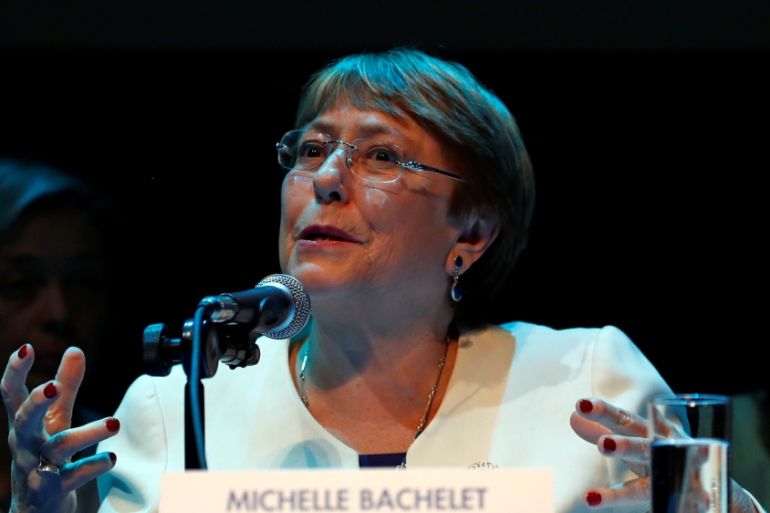UN rights chief condemns ‘shocking’ Saudi mass executions
Michelle Bachelet joins rights groups in condemning Saudi Arabia’s beheading of 37 men over terrorism charges.

The UN human rights chief on Wednesday called Saudi Arabia’s mass executions of 37 men “shocking” and “abhorrent”, joining a growing chorus of condemnation by rights groups and activists.
Saudi Arabia’s interior ministry said on Tuesday it beheaded dozens of its citizens over terrorism-related crimes, publicly pinning two of the bodies to a pole as a warning to others.
Keep reading
list of 4 itemsRecord number of people executed for drug offences in 2023
Executions in Iran hit 8-year high in 2023
Australian writer Yang Hengjun sentenced to death on China spy charges
“I strongly condemn these shocking mass executions across six cities in Saudi Arabia yesterday,” UN High Commissioner for Human Rights Michelle Bachelet said in a statement.
“It is particularly abhorrent that at least three of those killed were minors at the time of their sentencing,” she added.
The men had been convicted of charges including attacking security installations with explosives, killing a number of security officers, and cooperating with “enemy organisations” against the interests of the country.
Bachelet said the executions were carried out despite repeated warnings from rights officials and UN rapporteurs about lack of due process and fair trial guarantees amid allegations that confessions were obtained through torture.
The Chilean UN official urged Saudi Arabia to review its counterterrorism legislation, expressly prohibit the death penalty for minors, and halt pending executions including of three men on death row – Ali al-Nimr, Dawood al-Marhoon and Abdulla al-Zaher – whose cases she said had been taken up by the UN rights system.
Speaking to Al Jazeera from the Swiss city of Geneva, Ravina Shamdasani, spokeswoman for Bachelet, said the UN had “sought to take measures to prevent these executions from taking place in the first place”, and urged the Saudi authorities to not carry out the penalties, but “unfortunately, this was to no avail”.
“We are now concerned because there are others who remain on death row and we are calling on the authorities to halt any imminent execution, to review the legislation relating to the death penalty, and in particular to outlaw the execution of those who are convicted as minors,” Shamdasani said.
‘Sectarian decision’
Tuesday’s sentences were carried out in Riyadh, the Muslim holy cities of Mecca and Medina, central Qassim province, and Eastern Province, home to the country’s Shia minority.
Bachelet pointed out most of the 37 belonged to the Shia-Muslim minority and some had been involved in protests.
New York-based Human Rights Watch (HRW) said on Wednesday at least 33 of the 37 men put to death were Shia and it was the largest set of executions in the kingdom since January 2016, when 47 people were killed.
This is the largest mass executions of Shias in the history of Saudi Arabia since the 1900s
Amnesty International also said late on Tuesday the majority of those executed in six cities belonged to the Shia minority and were convicted after “sham trials”, including at least 14 people who participated in anti-government protests in the kingdom’s oil-rich Eastern Province in 2011-2012.
Ali al-Ahmed, director of the Institute for Gulf Affairs, a US-based think-tank, said a few Sunnis were among those executed “so the list doesn’t look like a sectarian decision”, he told Al Jazeera from Washington, DC.
“This is the largest mass executions of Shias in the history of Saudi Arabia since the 1900s,” al-Ahmed added.
The Shia community in Saudi Arabia “will face greater challenges”, he warned.
Prolific executor
Saudi Arabia is one of the world’s most prolific executor.
Along with Iran, Vietnam and Iraq, the kingdom accounted for 78 percent of total reported executions last year, according to Amnesty’s annual report, published this month.
Amnesty said the kingdom has stepped up the rate of executions in 2019, with at least 104 people put to death since the start of the year compared with 149 for the whole of 2018.
Tuesday’s mass execution was “another gruesome indication of how the death penalty is being used as a political tool to crush dissent from within” the country’s Shia minority, said Lynn Maalouf, the group’s research director for the Middle East.
European Union foreign policy chief Federica Mogherini said the executions heightened doubts about respect for the right to a fair trial in Saudi Arabia and could generate sectarian violence.
“Mass executions are not the mark of a ‘reformist’ government, but rather one marked by capricious, autocratic rule,” HRW’s Middle East director Michael Page said.